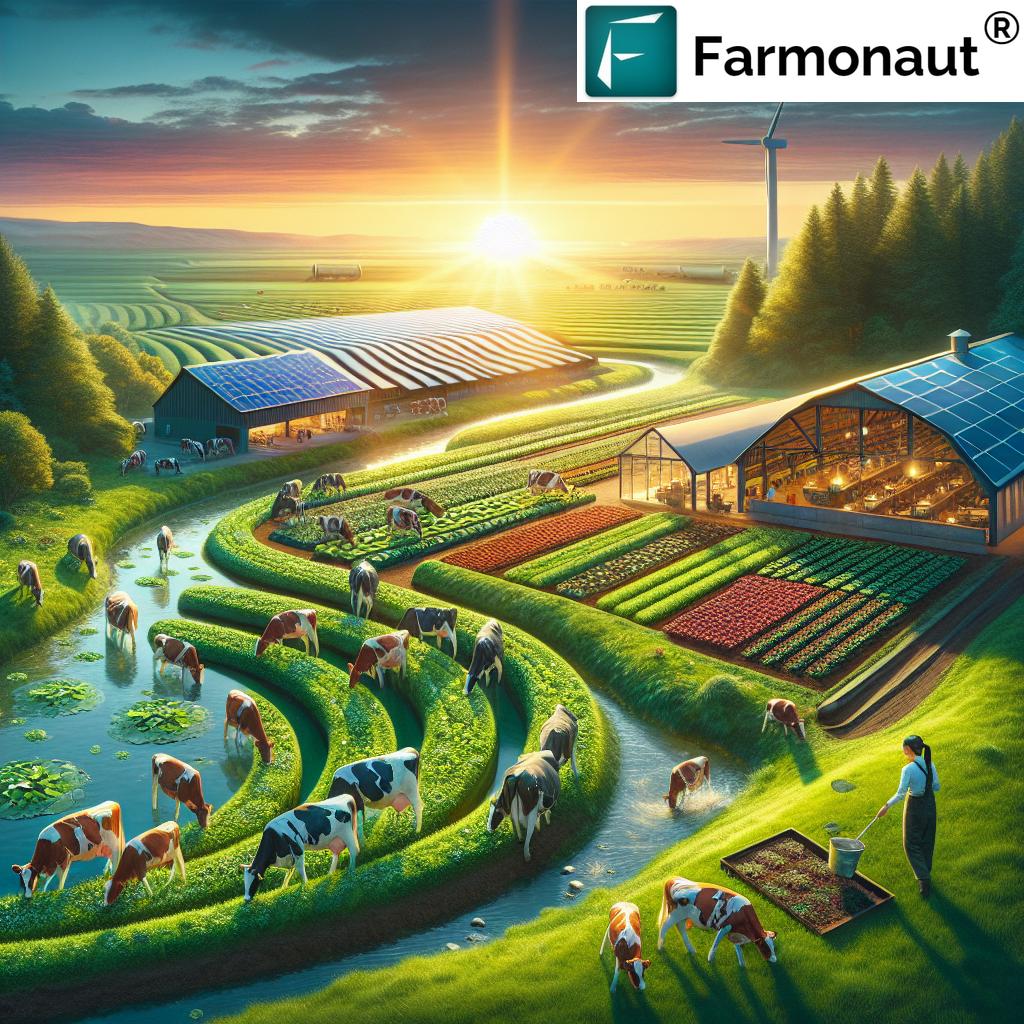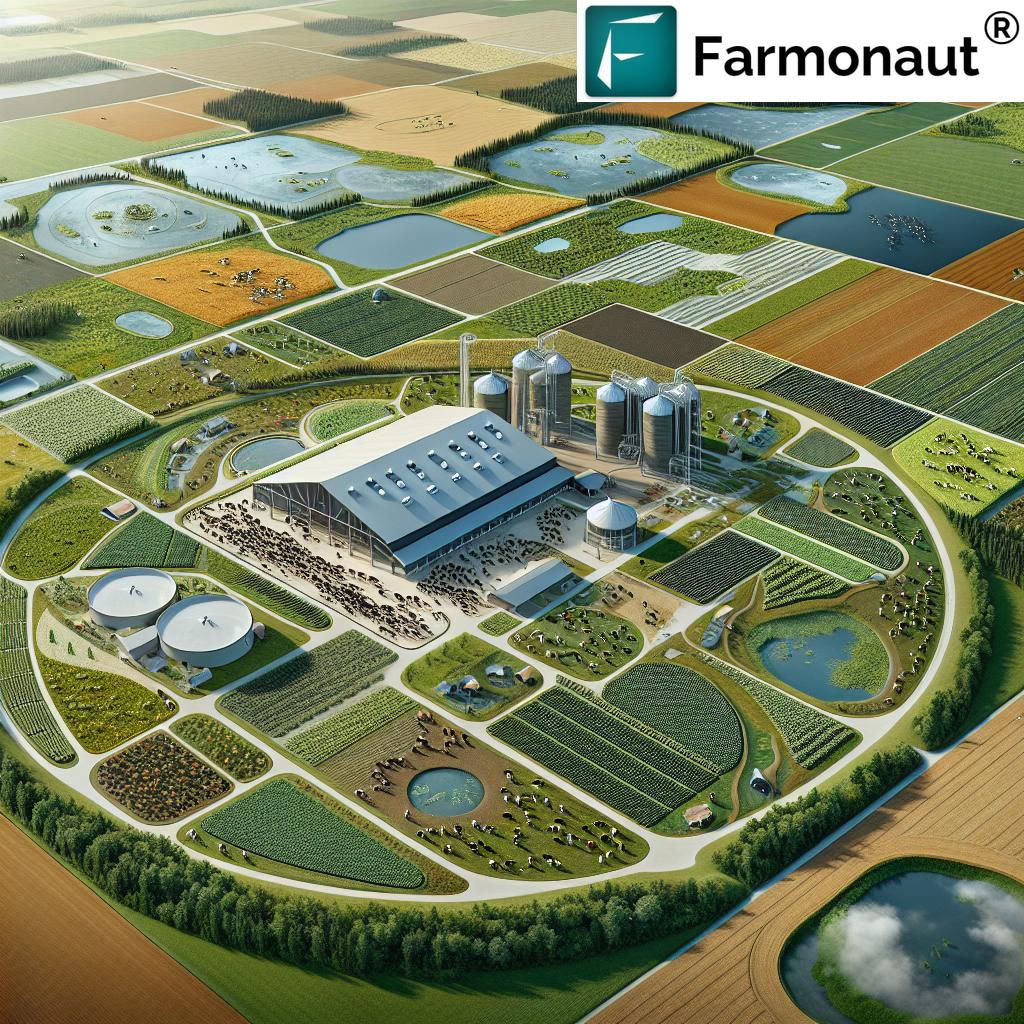Revolutionizing Canadian Dairy: Sustainable Practices for a Net-Zero Future in Agriculture
“Canadian dairy farmers aim to achieve net-zero emissions by 2050, revolutionizing sustainable agriculture practices.”
We, as representatives of the Canadian dairy industry and Farmonaut, are excited to share with you the groundbreaking initiatives and sustainable practices that are transforming the landscape of dairy farming in Canada. Our journey towards a net-zero future is not just about reducing emissions; it’s about reimagining the entire dairy production process to ensure a harmonious balance between productivity, animal welfare, and environmental stewardship.

The Path to Sustainability in Canadian Dairy Farming
In recent years, the Canadian dairy sector has made significant strides in adopting sustainable farming practices. Our commitment to environmental stewardship is driven by the urgent need to address climate change while ensuring food security for future generations. Let’s explore the innovative strategies and technologies that are propelling us towards our ambitious net-zero goals.
Embracing Rotational Grazing for Healthier Soils and Happier Cows
One of the cornerstone practices in sustainable dairy farming is rotational grazing. This method involves dividing pastures into smaller sections and moving cattle between them at regular intervals. The benefits of this approach are multifaceted:
- Improved soil health through natural fertilization and reduced compaction
- Enhanced biodiversity as native plant species are given time to recover
- Increased carbon sequestration in the soil
- Better animal welfare as cows have access to fresh, nutritious grass
By implementing rotational grazing, Canadian dairy farmers are not only improving the quality of their milk but also contributing to the overall health of their farm ecosystems.
Soil Health Improvement Techniques
Healthy soil is the foundation of sustainable agriculture. Canadian dairy farmers are adopting various soil health improvement techniques to enhance fertility, water retention, and carbon storage. These include:
- Cover cropping to prevent erosion and add organic matter
- Reduced tillage practices to maintain soil structure
- Composting and manure management for natural fertilization
- Crop rotation to break pest cycles and improve nutrient balance
These practices not only boost farm productivity but also play a crucial role in mitigating climate change by sequestering carbon in the soil.
Biodiversity Preservation in Agriculture
Preserving biodiversity is essential for maintaining a balanced ecosystem on dairy farms. Canadian farmers are taking proactive steps to protect and enhance biodiversity:
- Creating wildlife corridors and buffer zones
- Planting native species to support local flora and fauna
- Implementing integrated pest management to reduce chemical use
- Maintaining wetlands and natural habitats on farm properties
These efforts not only contribute to environmental conservation but also create a more resilient and productive farm ecosystem.
Water Management: A Key to Sustainable Dairy Farming
Efficient water management is crucial for sustainable dairy operations. Canadian farmers are implementing innovative water conservation techniques to reduce their environmental footprint:
- Precision irrigation systems to minimize water waste
- Rainwater harvesting for non-potable farm uses
- Streambank restoration to prevent erosion and improve water quality
- Wetland conservation to naturally filter and store water
By optimizing water use, dairy farms are not only reducing their environmental impact but also improving their resilience to climate change-induced water scarcity.
Emissions Reduction Strategies in Canadian Dairy Farming
Reducing greenhouse gas emissions is a top priority for the Canadian dairy industry. Farmers are employing a range of strategies to minimize their carbon footprint:
- Methane capture and biogas production from manure
- Improved feed efficiency to reduce enteric fermentation
- Energy-efficient equipment and renewable energy adoption
- Precision farming techniques to optimize resource use
These efforts are supported by ongoing research and innovation in the sector, driving us closer to our net-zero emissions target.
The Role of Technology in Sustainable Dairy Farming
Technology plays a pivotal role in the transition to sustainable dairy farming. Farmonaut, a leading agricultural technology company, offers cutting-edge solutions to support Canadian dairy farmers in their sustainability journey. Through its advanced satellite-based farm management platform, Farmonaut provides valuable tools for:
- Real-time crop health monitoring
- AI-driven advisory systems for optimal farm management
- Blockchain-based traceability for supply chain transparency
- Resource management and carbon footprint tracking
These technological advancements enable farmers to make data-driven decisions, improving both productivity and sustainability.
Explore Farmonaut’s innovative solutions:
“Rotational grazing in dairy farming improves soil health and preserves biodiversity, contributing to overall farm sustainability.”
Animal Welfare: A Core Principle of Sustainable Dairy Farming
Sustainable dairy farming goes hand in hand with excellent animal care. Canadian dairy farmers are committed to maintaining high standards of animal welfare through:
- Comfortable housing systems with proper ventilation and bedding
- Regular veterinary care and preventive health measures
- Stress-free handling and transportation practices
- Nutritionally balanced diets tailored to each stage of life
By prioritizing animal welfare, farmers not only ensure the well-being of their herds but also improve milk quality and farm efficiency.

The Impact of Sustainable Practices on Food Quality and Nutrition
The adoption of sustainable farming practices has a direct positive impact on the quality and nutritional value of dairy products. By focusing on soil health, biodiversity, and animal welfare, Canadian dairy farmers are producing milk that is:
- Rich in essential nutrients
- Free from harmful residues
- Better tasting due to improved animal diets
- More sustainable, appealing to environmentally conscious consumers
This commitment to quality ensures that Canadian dairy products continue to be a vital part of a healthy, balanced diet while supporting environmental sustainability.
Collaborative Efforts in the Canadian Dairy Industry
Achieving sustainability goals in the dairy sector requires collaboration across the entire industry. Canadian dairy farmers are working closely with:
- Research institutions to develop innovative farming techniques
- Government agencies to align with national environmental policies
- Technology providers like Farmonaut to implement precision farming tools
- Consumers to build awareness about sustainable dairy practices
This collaborative approach ensures that the transition to sustainable practices is comprehensive and effective.
The Role of Policy in Promoting Sustainable Dairy Farming
Government policies play a crucial role in supporting the transition to sustainable dairy farming. Canadian policymakers are implementing measures such as:
- Financial incentives for adopting sustainable practices
- Research funding for innovative agricultural technologies
- Regulations to limit environmental impacts
- Support for farmer education and training programs
These policies create a supportive framework for farmers to invest in sustainable practices and technologies.
The Future of Sustainable Dairy Farming in Canada
As we look towards the future, the Canadian dairy industry is poised to lead the way in sustainable agriculture. Our vision includes:
- Widespread adoption of regenerative farming practices
- Integration of AI and IoT technologies for precision farming
- Development of carbon-neutral dairy farms
- Enhanced traceability and transparency in the dairy supply chain
With ongoing innovation and commitment to sustainability, we are confident in our ability to meet the growing demand for dairy products while preserving our environment for future generations.
Sustainable Practices Comparison in Canadian Dairy Farming
| Practice Area | Traditional Method | Sustainable Alternative |
|---|---|---|
| Grazing Techniques | Continuous grazing on large pastures | Rotational grazing (30% reduction in soil erosion, 20% increase in soil organic matter) |
| Soil Management | Heavy tillage and synthetic fertilizers | Reduced tillage, cover cropping (25% increase in soil carbon sequestration) |
| Water Conservation | Flood irrigation | Precision irrigation (40% reduction in water usage) |
| Emissions Reduction | No methane capture | Methane capture and biogas production (50% reduction in GHG emissions) |
| Biodiversity Preservation | Monoculture farming | Diverse crop rotation, wildlife corridors (35% increase in on-farm biodiversity) |
| Farmonaut’s Tools | Manual farm monitoring | Satellite-based crop health monitoring, AI advisory (20% improvement in resource efficiency) |
Frequently Asked Questions
Q: What is net-zero farming in the dairy industry?
A: Net-zero farming in the dairy industry refers to practices that aim to balance the greenhouse gas emissions produced by dairy operations with an equivalent amount of emissions removed from the atmosphere. This is achieved through a combination of emission reduction strategies and carbon sequestration techniques.
Q: How does rotational grazing benefit the environment?
A: Rotational grazing benefits the environment by improving soil health, increasing biodiversity, enhancing carbon sequestration, and reducing soil erosion. It allows pastures to recover between grazing periods, promoting healthier plant growth and a more diverse ecosystem.
Q: What role does technology play in sustainable dairy farming?
A: Technology plays a crucial role in sustainable dairy farming by providing tools for precision agriculture, resource management, and environmental monitoring. Companies like Farmonaut offer satellite-based crop health monitoring, AI-driven advisory systems, and carbon footprint tracking to help farmers optimize their operations and reduce environmental impact.
Q: How are Canadian dairy farmers reducing their carbon footprint?
A: Canadian dairy farmers are reducing their carbon footprint through various methods, including methane capture from manure, improved feed efficiency to reduce enteric fermentation, adoption of energy-efficient equipment, use of renewable energy sources, and implementation of precision farming techniques.
Q: What is the impact of sustainable dairy farming on milk quality?
A: Sustainable dairy farming practices often lead to improved milk quality by enhancing animal welfare, optimizing nutrition, and reducing stress on cows. These practices result in milk that is rich in essential nutrients and free from harmful residues, while also appealing to environmentally conscious consumers.
Conclusion: A Sustainable Future for Canadian Dairy
The Canadian dairy industry is at the forefront of sustainable agriculture, pioneering innovative practices that balance productivity with environmental stewardship. Through the adoption of rotational grazing, soil health improvement techniques, water conservation measures, and emissions reduction strategies, Canadian dairy farmers are paving the way towards a net-zero future.
The integration of cutting-edge technologies, such as those offered by Farmonaut, is accelerating this transition, providing farmers with the tools they need to make data-driven decisions and optimize their operations. As we continue to innovate and collaborate, the Canadian dairy sector is not only ensuring food security for future generations but also setting a global standard for sustainable farming practices.
By choosing Canadian dairy products, consumers are supporting a vision of agriculture that prioritizes environmental sustainability, animal welfare, and nutritional quality. Together, we are building a resilient and sustainable food system that will nourish our communities for generations to come.
Explore Farmonaut’s API for advanced agricultural insights:
Farmonaut API
API Developer Docs






